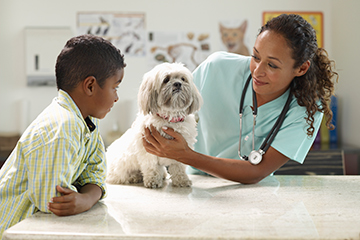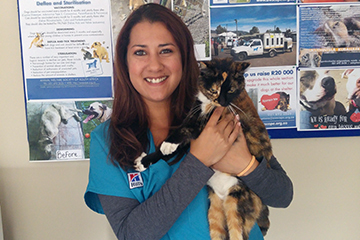World Veterinary Day 2016
Every year in April, we give recognition to the veterinary profession on World Veterinary Day which was started by the World Veterinary Association (WVA) in 2000 and it is celebrated annually on the last Saturday of April.
Veterinarians make numerous contributions to the health of both animals and humans, underlining the vital role that veterinarians play in ensuring animal welfare, food safety, food security, safe world trade in animals and animal products as well as protecting public health.
The role of a veterinarian
Besides providing healthcare for animals, veterinarians or vets are also involved in public health as a means of improving the welfare of animals, people and the environment.
Veterinarians also:
- investigate disease outbreaks such as rabies, Ebola and bird flu that can be transmitted from animals to humans known as zoonotic diseases,
- do research to develop vaccines and cures for diseases in animals that can also help cure and prevent diseases in people,
- develop policies and promote laws to improve the care and welfare of animals around the world, and
- care for animals that are used for food, so that beef, pork, fish and poultry products are safe and nutritious for people.
State veterinarians offering veterinary services in local areas
In addition to providing healthcare to pets and livestock, state veterinarians are also authorised in terms of legislation to perform regulatory functions such as animal disease and food safety control.
State veterinarians offer services such as monitoring animal disease risk, preventing the spread of disease, monitoring the implementation of hygiene management practices at abattoirs and food producing establishments as well as inspecting, testing and certifying all animals and animal by-products that leave the Western Cape.
Compulsory community service veterinarians
Compulsory community service (CCS) veterinarians are veterinarians who provide services in terms of their training. They are stationed at state veterinary offices, animal welfare organisations, abattoirs and wherever there is a need for more veterinary services.
Working as a CCS veterinarian in the underprivileged community
We spoke to CCS veterinarian, Rushda Khan and got a better understanding of the type work she does for the community.
Rushda is 1 of 19 CCS vets. For the last 4 months she has been working at the Animal Welfare Society in Phillipi. She mainly deals with underprivileged communities such as Mitchells Plain, where she provides advice and primary healthcare such as vaccinations, deworming, sterilisations, dentals and also treats any emergencies that the people may have had with their pets or animals.
She tries to educate kids from the neighbouring Samora Machel community on the welfare and proper handling of animals as well as the proper treatment and feeding of their cats and dogs and making them see their pets as part of their family.
She also works at the Export Certification office in Milnerton for the Western Cape Department of Agriculture where she does export certifications, be it for people taking their pets overseas or any animal related product or by-product that crosses the border. She also conducts audits to assess and approve or deny a facility being an export facility. This is important for the prevention of animal related diseases from spreading to and from other countries and improving food security.
“I love my job because of the wide variety of aspects of the veterinary industry I am exposed to, from community work to exports which is the more industrial side of my job”, said Rushda.
Rushda is also exposed to a wide variety of surgical procedures and she’s learnt to do a lot with limited resources at her disposal.
Cape of Good Hope SPCA Mobile Clinics
The Cape of Good Hope SPCA Mobile Clinics are committed to deliver care to those who are most in need. They operate in the informal settlements and impoverished communities where they provide primary veterinary care and educate owners about responsible pet care. Some of the vital services the mobile clinics provides are dipping, de-worming and vaccinating.
The areas they serve are Bishop Lavis, Blackheath, Capricorn Park, Coniston Park, Eerste River, Forest Hieghts, Gugulethu, Harare, Khayelitsha, Kraaifontein, Kuils River/Highberry Park, Mandalay, Mfuleni, Parkwood, Plumstead, Seacrest/Bayview, Seawinds, Silversands, Steenberg, Stradford Green and Strandfontein.
Visit the Cape of Good Hope SPCA website to check the schedule and see when the mobile clinic will be in your area and what time they will be operating.
If you want to find out more about the Cape of Good Hope SPCA's mobile clinics, contact their Animal Hospital on 021 700 4145/64.
NGO’s offering veterinary services in the Western Cape
All animals need lots of love and care. There are NGOs in the Western Cape who are passionate about animal welfare and can assist when your pet or animal needs it the most.
You can also provide a helping hand or make donations to an NGO of your choice. It’s advisable to first contact the NGO to determine their needs.
Here are some animal welfare NGOs which operate in the Western Cape:
- Animal Anti-Cruelty League
- Animal Welfare Society of South Africa
- Bitou Horse Welfare
- Cart Horse Protection Association
- Cape of Good Hope SPCA
- Domestic Animal Rescue Group (DARG)
- Mdzananda Animal Clinic Khayelitsha
- Pet Empowerment in Townships (PETS)
- TEARS Animal Rescue
- Township Animal Rescue
- The South African Foundation for the Conservation of Coastal Birds (SANCCOB)


